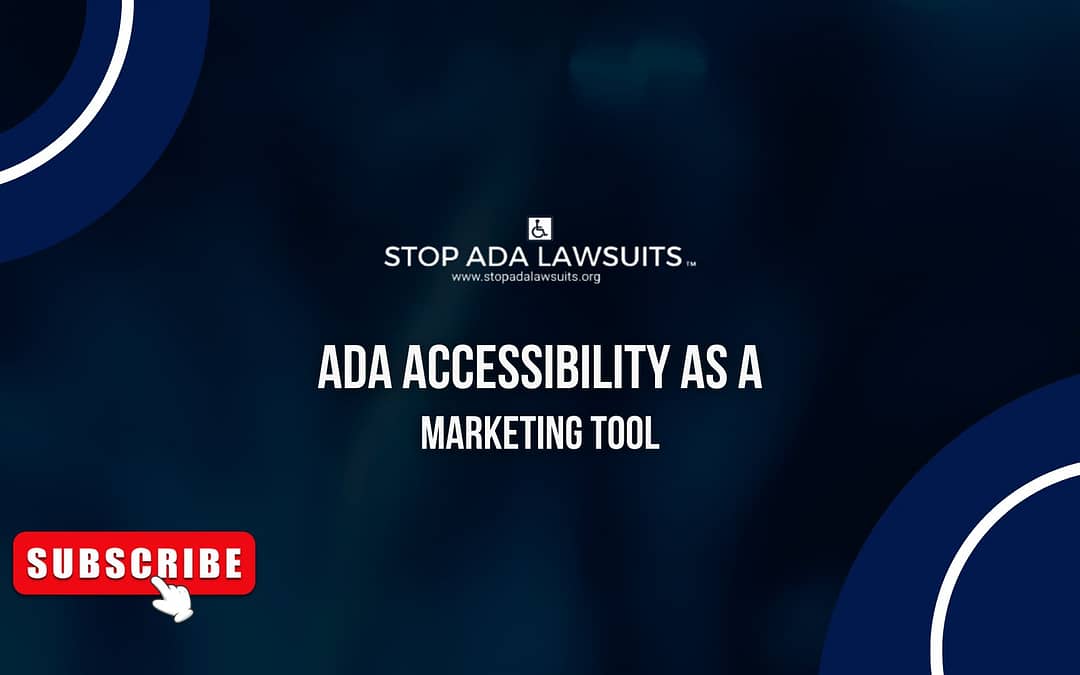In today’s competitive market, businesses must not only meet legal standards but also find ways to stand out and connect with broader audiences and they can with more accessibility. ADA (Americans with Disabilities Act) compliance is often viewed as a legal necessity to avoid fines and lawsuits, but it also presents a powerful marketing opportunity. By prioritizing accessibility, businesses can demonstrate their commitment to inclusion, improve customer experience, and attract a loyal and diverse customer base.
Table of Contents
ToggleThe Value of Inclusion in Business
Inclusivity and accessibility sends a clear message: your business cares about every customer. By making your business accessible to people with disabilities, you not only comply with the law but also open your doors to millions of potential customers. According to the CDC, 1 in 4 adults in the U.S. lives with a disability, representing a significant portion of the market.
Accessible businesses are:
- More welcoming: Customers feel valued when their needs are considered.
- More convenient: Accessibility features enhance the experience for all customers, not just those with disabilities (e.g., ramps for parents with strollers).
- More competitive: Inclusive practices set you apart from businesses that fail to prioritize accessibility.
How ADA Compliance Boosts Your Marketing Strategy
1. Enhanced Customer Loyalty
Accessible businesses create memorable experiences for customers, fostering trust and repeat visits. A customer who feels their needs are understood is more likely to become a loyal advocate for your brand.
2. Broadened Audience Reach
Accessibility ensures your products and services are available to everyone, including people with disabilities, elderly customers, and families with children. Word-of-mouth referrals and positive reviews from these groups can exponentially increase your reach.
3. Improved Brand Image
Inclusion is a powerful brand differentiator. Customers increasingly prefer businesses that reflect their values. ADA compliance showcases your commitment to social responsibility and equal opportunities, improving your reputation and appeal.
4. SEO and Digital Visibility
For businesses with websites, ADA compliance also enhances digital accessibility. Adding alt text for images, providing captions for videos, and ensuring keyboard navigation helps your site rank better in search engines, making it easier for all users to find you online.
5. Increased Sales Opportunities
When more customers can access your business, your revenue potential naturally grows. For instance, installing ramps, accessible restrooms, and clear signage can make your location more inviting and convenient for everyone.
Practical Steps to Use ADA Accessibility as a Marketing Tool
- Audit Your Business
Start by assessing your physical and digital spaces for compliance. Identify barriers and prioritize fixes. - Highlight Accessibility Features
Make sure your marketing materials (website, brochures, ads) emphasize accessibility. For example:- “Wheelchair-accessible entrance.”
- “Hearing aid-compatible systems available.”
- “Website optimized for screen readers.”
- Share Success Stories
Showcase testimonials from customers who have benefited from your accessible features. - Collaborate with Local Groups
Partner with disability advocacy groups to gain insights, host events, or receive endorsements. - Train Staff
Empower your team to understand and accommodate diverse needs, creating an inclusive environment from the moment a customer walks through the door.
Real-World Example: Inclusion Driving Success
Retail giant Target made headlines by incorporating adaptive clothing lines designed for people with disabilities. This initiative not only met an unaddressed need but also earned widespread praise, media coverage, and customer loyalty. Similarly, restaurants with braille menus or hotels with accessible rooms often see increased bookings and positive reviews.
Conclusion
ADA compliance is not just about meeting regulations; it’s about creating a space where everyone feels welcome. By embracing accessibility as a marketing tool, businesses can tap into a growing, loyal customer base while strengthening their brand image. In today’s market, inclusivity isn’t just good ethics—it’s good business.
Take the first step today by assessing your compliance and discovering how inclusion can transform your business into a hub for all. For professional guidance, Stop ADA Lawsuits offers comprehensive consulting to ensure you not only meet standards but thrive.

